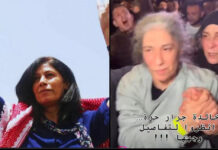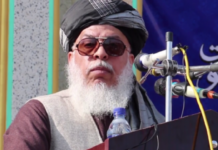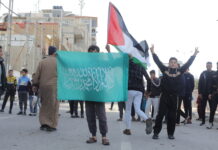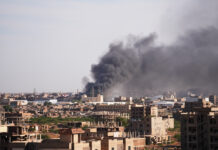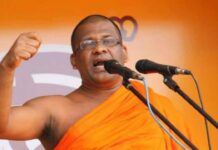Sri Lanka has banned face coverings in public following the Easter Sunday attacks that killed at least 250 people and injured hundreds more.
President Maithripala Sirisena said he was using an emergency law to impose the restriction from Monday. Any face garment which “hinders identification” will be banned to ensure national security, his office said.
The niqab and burqa – worn by Muslim women – were not specifically named. The move is perceived as targeting the garments, however.
The measures would help security forces to identify people as a hunt for any remaining attackers and their support network continues across the Indian Ocean island, authorities said.
But there are concerns within the Muslim community that a prolonged ban could fuel tensions in the religiously-diverse nation that emerged from a civil war with ethnic minority Tamil separatists a decade ago.
The All Ceylon Jamiyyathul Ulama (ACJU), the top body of Islamic scholars in Sri Lanka, said they supported a short-term ban on security grounds, but opposed any attempt to legislate against burqas.
“We have given guidance to the Muslim women to not to cover their faces in this emergency situation,” ACJU assistant manager Farhan Faris said after the scholars asked the government to drop plans for a law against the burqa and niqab.
Subscribe to our newsletter and stay updated on the latest news and updates from around the Muslim world!
“If you make it a law, people will become emotional and this will bring another bad impact … it is their religious right,” he told Reuters.
Human Rights Watch condemned the ban. “That needless restriction means that Muslim women whose practice leads them to cover up now won’t be able to leave home,” the group’s executive director Kenneth Roth tweeted.
Sri Lanka remains on high alert eight days after “Islamist groups” linked to foreign organisations were blamed for attacks that hit churches and hotels.
Dozens of suspects have been arrested, but local officials warned that more “militants” remained at large.
Sri Lanka has a sizeable and centuries-old Muslim population – out of 21 million, just under 10% are Muslim. Only a small number of women are thought to wear the niqab or the burqa.
Last week a Sri Lankan MP had proposed a ban on women wearing the burqa, saying it should be outlawed on security grounds.
The number of people arrested in connection with the bloodshed has risen to 150. Sri Lankan authorities are also hunting for around 140 followers of ISIS, which has said it was involved in the bombings but has not given details.







